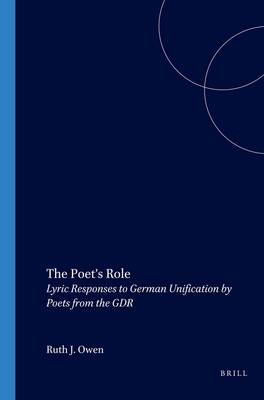
- Afhalen na 1 uur in een winkel met voorraad
- Gratis thuislevering in België vanaf € 30
- Ruim aanbod met 7 miljoen producten
- Afhalen na 1 uur in een winkel met voorraad
- Gratis thuislevering in België vanaf € 30
- Ruim aanbod met 7 miljoen producten
Zoeken
Omschrijving
This study of contemporary German poetry represents the first attempt to examine comprehensively and at some length the lyric response to the unification period. It sets out to investigate, by means of close textual analysis, whether the German 'Wende' was also a turning-point for poetry, exploring how GDR poets responded both to the revolutionary events of 1989 and subsequently to the new, united Germany. An introductory chapter considers what is distinct about poetry as a genre, especially under censorship or amid historic change, as well as outlining the post-unification 'Literaturstreit'. The following chapter offers a survey of the poet's role in the GDR from 1949 until 1989. Two central chapters then gather the poetry of the 'Wende' and unification as a corpus of work and characterize it, through the elucidation of recurring themes, motifs and techniques. The volume strikes a balance between giving a general overview of poetry written in 1989-1996 and focusing on individual poets whose work is particularly compelling. After identifying broad trends across a wide range of individual poems, collections and anthologies, single chapters therefore examine in greater depth the work of Volker Braun and Durs Grünbein. The concluding chapter addresses the issue of a separate GDR literature. Finally, an extensive, structured bibliography is provided, covering the poetry, literary criticism and cultural history of the period.
Specificaties
Betrokkenen
- Auteur(s):
- Uitgeverij:
Inhoud
- Aantal bladzijden:
- 380
- Taal:
- Engels
- Reeks:
- Reeksnummer:
- nr. 147
Eigenschappen
- Productcode (EAN):
- 9789042012073
- Verschijningsdatum:
- 1/01/2001
- Uitvoering:
- Paperback
- Formaat:
- Trade paperback (VS)
- Afmetingen:
- 155 mm x 234 mm
- Gewicht:
- 526 g

Alleen bij Standaard Boekhandel
+ 340 punten op je klantenkaart van Standaard Boekhandel
Beoordelingen
We publiceren alleen reviews die voldoen aan de voorwaarden voor reviews. Bekijk onze voorwaarden voor reviews.








